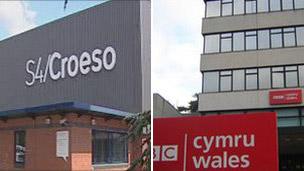S4C and BBC agree deal over the channel's future
- Published

The UK government is making the BBC responsible for funding S4C
The BBC and the S4C Authority have reached an agreement over the future and funding of S4C until 2017.
It guarantees S4C's future funding and gives the BBC a voice in the channel's direction and in choosing the authority's members.
BBC Trust chairman Lord Patten said it was "good news for the audience" while S4C Authority chairman Huw Jones said it was a "significant agreement".
The deal has been welcomed by UK and Welsh government ministers.
A statement said the deal, agreed with the Department for Culture, Media and Sport (DCMS), "will protect the editorial and managerial independence of S4C, whilst safeguarding appropriate accountability to the BBC Trust for licence fee funding spent by the service".
Lord Patten said: "Our agreement safeguards S4C's editorial independence while ensuring effective oversight of licence fee funds.
"It will also forge a closer working relationship between BBC Wales and S4C, which will see savings reinvested in quality programming that viewers expect.
Mr Jones said: "The outcome is a significant step forward for the channel at the end of detailed and protracted talks between the three parties, and I would like to pay tribute to all who had participated in the discussions and negotiations that led up to what is a historic and significant agreement.
"This agreement will safeguard the Welsh language services provided by S4C for the foreseeable future.
"It will allow S4C to maintain its editorial and managerial independence, while providing accountability to the BBC Trust for income received from the licence fee, and to DCMS for its part of S4C's funding.
Financial climate
"The funding formula which the BBC Trust has offered for the 2015-2017, and which the S4C Authority has accepted, while challenging, will provide stability for S4C and the production sector in a difficult financial climate, as we identify and deliver efficiencies, and build a new partnership with the BBC."
It was announced last year that the bulk of S4C's funding would come from the BBC licence fee in future, and the two broadcasters have been trying to reach agreement since.
The agreement was reached ahead of a debate in the Commons on S4C's future on Tuesday, and is subject to the successful passage of the Public Bodies Bill.
Ms Closs Stephens said: "I think this is probably the most generous position that the BBC Trust could accomplish and it is, I think, an expression of goodwill towards the channel and towards Welsh language audiences."
UK government Communications Minister Ed Vaizey said: "These proposed partnership arrangements are a great outcome for Welsh language broadcasting.
"They not only ensure S4C's editorial and managerial independence, they also offer a very reassuring level of financial security for the next five years.
"I'm confident that this offers the stability and certainty S4C needs to go from strength to strength under its new chairman and chief executive."
First Minister Carwyn Jones said: "I am pleased that we have reached an amicable end to what has obviously been a highly charged and emotive debate."
Licence fee
Heritage Minister Huw Lewis said: "We have always made it clear that we believe it imperative that S4C remains editorially and operationally independent of the BBC, and are therefore extremely pleased with today's announcement."
On Monday, it emerged that the BBC Trust had proposed that S4C should find similar savings to BBC Wales when it is funded from the licence fee.
S4C's allocation would fall from £76.3m in 2013/14 to £74.5m in 2016/17 as part of the new relationship between the two broadcasters.
The funding does not include the 10 hours a week of programming the BBC currently provides S4C, such as the soap opera Pobol y Cwm and the news service Newyddion, worth about £23m a year. It is expected to fall to about £20m by 2013.
Members of the S4C Authority discussed the deal on Monday night.
Last year, the BBC contributed £7.6m to Gaelic television channel BBC Alba, which also draws on commercial revenue.
Gaelic was spoken by about 58,600 people at the time of the 2001 census, compared to 582,000 Welsh speakers.
- Published25 October 2011
- Published18 October 2011
- Published14 October 2011
- Published6 October 2011
- Published8 October 2011